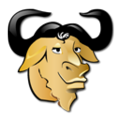Difference between revisions of "Free and open-source software/Intro"
| (14 intermediate revisions by the same user not shown) | |||
| Line 1: | Line 1: | ||
| − | [[Image:Coloured GNU.png| | + | [[Image:Coloured GNU.png|120px|right|Free software foundation's GNU logo]] '''Free and open-source software''' (also known simply as '''Free software''' or '''Open source software''') is software created by loose networks of people (both companies and individuals) who collaborate for mutual benefit. The software they produce is also made available for anyone else to freely download, use and modify because the developers also publish the human readable {{wp|Source_code|source code}} used to create it. |
| − | Making source code available means anyone with the programming ability can customise the software for their own ends or contribute to the development project directly. Others can help by reporting bugs and helping with documentation or translation efforts. So this encouragement of interaction between users and developers, and | + | Making source code available means anyone with the programming ability can customise the software for their own ends or contribute to the development project directly. Others can help by reporting bugs and helping with documentation or translation efforts. So this encouragement of interaction between users and developers, and some users ''becoming'' developers, creates a positive feedback loop in the software's evolution. Open source is becoming a very prominent method of software production and poses a serious challenge to commercial products - as the quality of open-source software approaches and supercedes commercial software, how will software companies compete with free? |
| − | + | Although 'free software' is usually free of charge, the 'free' in the title actually refers to the user's freedoms to use, modify and redistribute the software. It should be also noted that 'Free software' is not the same thing as 'freeware' or 'shareware' which although they might be free to download, do not usually come with source code and cannot be freely modified or redistributed. | |
Latest revision as of 12:40, 18 July 2010
Free and open-source software (also known simply as Free software or Open source software) is software created by loose networks of people (both companies and individuals) who collaborate for mutual benefit. The software they produce is also made available for anyone else to freely download, use and modify because the developers also publish the human readable source code used to create it.
used to create it.
Making source code available means anyone with the programming ability can customise the software for their own ends or contribute to the development project directly. Others can help by reporting bugs and helping with documentation or translation efforts. So this encouragement of interaction between users and developers, and some users becoming developers, creates a positive feedback loop in the software's evolution. Open source is becoming a very prominent method of software production and poses a serious challenge to commercial products - as the quality of open-source software approaches and supercedes commercial software, how will software companies compete with free?
Although 'free software' is usually free of charge, the 'free' in the title actually refers to the user's freedoms to use, modify and redistribute the software. It should be also noted that 'Free software' is not the same thing as 'freeware' or 'shareware' which although they might be free to download, do not usually come with source code and cannot be freely modified or redistributed.
